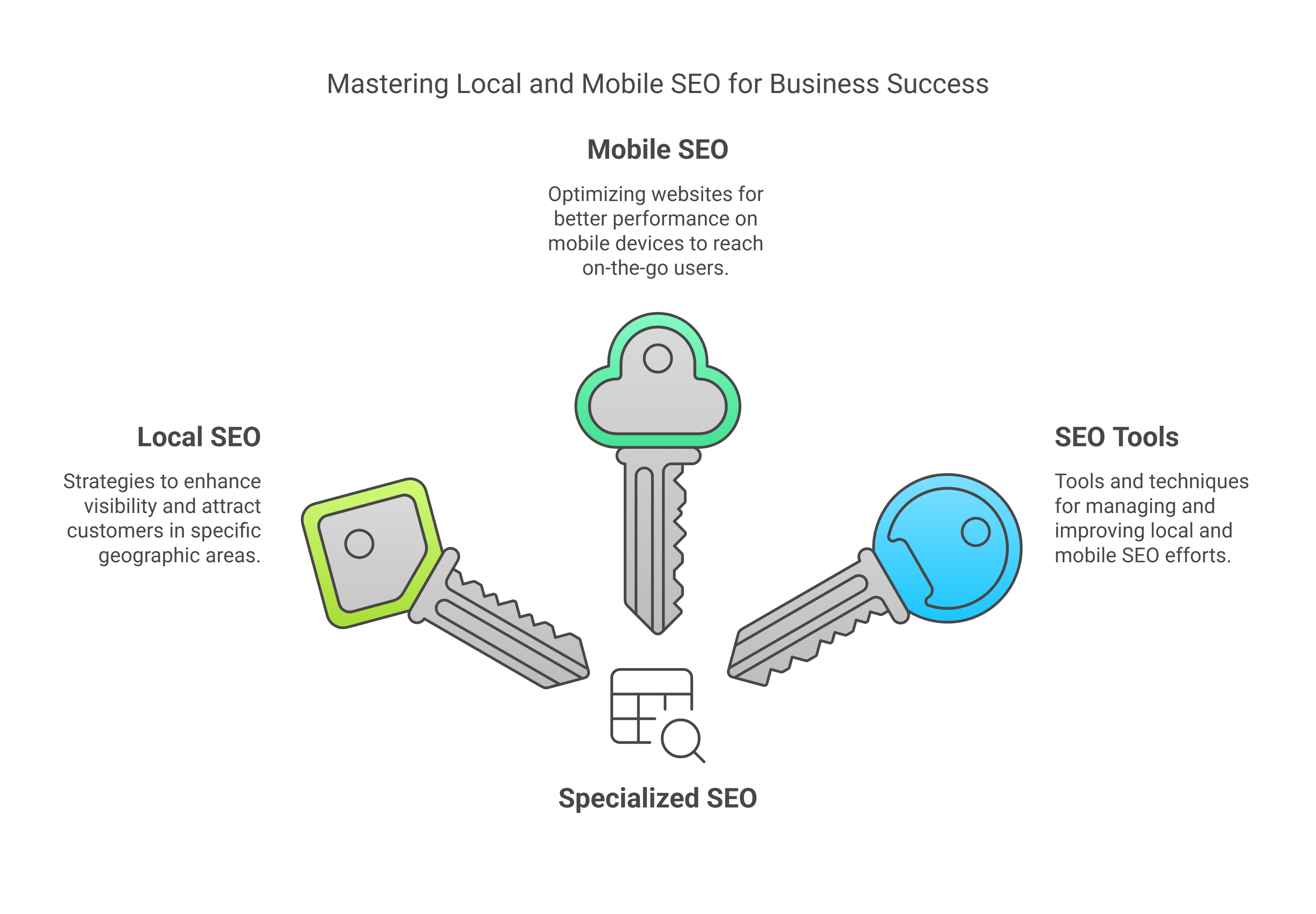Specialized SEO: Mastering Local and Mobile Search
Local SEO: Connecting with Customers in Your Community
- Definition of Local SEO:
Local SEO (Search Engine Optimization) is a digital marketing strategy that helps local businesses improve their visibility in search engine results when customers search for products and services in their geographical area. The goal is to increase organic traffic from local customers who are actively seeking what you offer.
-
Importance of Local SEO:
- Increased Local Visibility: Makes your business more visible to local customers.
- Attracting Local Customers: Helps you target customers who are near your business location.
- Improved Conversion Rates: Local searchers are often ready to buy, leading to higher conversion rates.
- Cost Effective Marketing: Its one of the most affordable types of marketing.
The elements of local SEO: keyword research, optimizing website, Google business profile, local directories, and customer reviews The elements of local SEO: keyword research, optimizing website, Google business profile, local directories, and customer reviews
-
The Elements of Local SEO:
- Keyword Research: Identifying relevant keywords that local customers use when searching for your products or services.
- Optimizing Your Website: Incorporating local keywords throughout your website content, title tags, meta descriptions, and headings.
- Claiming and Optimizing Your Google Business Profile: Creating and optimizing your Google My Business (GMB) listing with accurate information, photos, and engaging content.
- Listing Your Business in Local Directories: Submitting your business information to online directories like Yelp, Foursquare, and Yellow Pages to build citations.
- Encouraging Customer Reviews: Asking customers to leave positive reviews on Google, Yelp, and other review platforms.
-
The Elements of Local SEO:
-
Features of local SEO tools - These are various features of Local SEO tools -
-
Listing and Citation Management: Maintaining accurate and consistent NAP (Name, Address, Phone number) data across online directories, local platforms, and review sites.
-
Review Management: Tracking, responding to, and analyzing customer reviews.
-
Keyword Research: Discovering relevant keywords with local search intent to target a specific audience.
-
Competitor Analysis: Analyzing your competitors' SEO strategies to identify areas for improvement.
- Competitor analysis example : In order to get high customer engagement one must perform better than their competitor like Domino's and Pizza hut.
Tools for Local SEO
Here are some prominent tools used for Local SEO
-
Google My Business: Google offers insights, post scheduling, and review management features, useful for Local SEO
- "Starbucks" uses Google My Business to share their location and engage with customers.
- Moz Local: Moz provides tool for listings and citations management useful for Local SEO.
- SEMrush: SEMrush has competitor analysis, and local ranking, with local research for increasing visibility.
- BrightLocal: BrightLocal helps for SEO monitoring rankings.
- Whitespark: Whitespark helps in building citation and tracking of business.
- Yext: Yext is used to assist with local data management and ensures consistency for the directory.
- Ahrefs: Ahrefs has a lot features for providing with backlink analysis and keyword searching.
Key Components of Local SEO
- Google My Business (GMB) Optimization: Critical for visibility in local search results and on Google Maps.
- On-Page SEO: Developing location-relevant content and ensuring your NAP (Name, Address, Phone number) information is consistent.
- Local Citations: Accurate business listings on numerous websites and online directories.
- Online Reviews: Encouraging and managing user feedback on sites like Yelp and Google.
Importance of Local SEO
- Higher Conversion Rates: Local searchers are often further along in the buying process and ready to make a purchase.
- Improved Brand Awareness: Increased visibility in local search results helps build brand recognition within your community.
- A Competitive Advantage: Not all businesses invest in Local SEO, so optimizing for local search can give you a competitive edge.
- Connect with the community: - Through local SEO websites connect with the customers residing nearby and helps to better understand their requirements.
Mobile SEO: Optimizing for the On-the-Go User
- Definition of Mobile SEO:
Mobile SEO (Search Engine Optimization) is the practice of optimizing a website to rank higher in search engine results pages (SERPs) on mobile devices, such as smartphones and tablets. As more users access the internet via mobile, mobile SEO has become crucial for online visibility.
-
Importance of Mobile SEO:
- Mobile-Friendly: People are very inclined towards using phone due to their busy schedules. Mobile SEO makes it easy for the user to search any content they want to know
- User Experience (UX): Mobile SEO increases the traffic to user and better insights by Google by ensuring a high level user experience
- Algorithmic Priority:: Mobile SEO algorithms are prioritized over those of websites as the frequency of mobile use is more.
Best Mobile SEO Practices
- Mobile-First Indexing: Make sure that your Mobile version of a website has good indexing.
- Make sure Your Website has Good Security: Make sure that a user who enters your website doesn't face any security threat.
- Page Speed: Optimize your website so it will load faster for your user.
- Best Mobile-Friendy Content: Make all the content available to the user mobile friendly.

